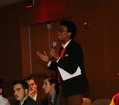

Isaiah Blake, the son of a New York City police officer, said he left the Sheen Center in Lower Manhattan “extremely enlightened’’ after attending “Gun Violence and the Police: A New York Perspective.”
WPIX-TV’s Magee Hickey served as the moderator for the 90-minute panel discussion on Oct. 26 that concluded with questions from attendees. Det. Steven McDonald; his wife Patti Ann, who is the mayor of Malverne in Nassau County; and their son Conor, an NYPD sergeant, were on the panel along with former New York City Police Commissioner Ray Kelly.
“Something important to me was putting myself in a spectrum of ideals. Ray Kelly is representing a spectrum of ideals, a different side I don’t get to hear a lot,” said Blake, a senior at Xavier High School in Manhattan and one of two dozen high school students representing Xavier and Cardinal Hayes in the Bronx.
“Seeing Steven and his family was a real thing. Because of the polarization of our country and the polarization of our conversations, we forget to see their humanity, we forget to see there is a family, and we forget to see there was a child. There was a story.”
Gun violence and the police, a heated topic across the country and an issue during the 2016 presidential campaign, came to the forefront during the question-and-answer portion at the conclusion of the discussion.
“When a business makes a mistake, it costs money. When a police officer makes a mistake, it may cost lives and that’s a big deal,” Kelly said. “The law gives police officers leeway because it’s not easy for a police officer going into a situation. You have to know all the details about a situation. Police officers want to go home every night. They have a right to protect themselves.
“The bottom line is some people are going to make mistakes because they are human beings. It’s a difficult business. They’re some very difficult decisions made by police officers that may turn out to be incorrect after lots of scrutiny, after a grand jury looks at it.”
In answering a question, Steven McDonald said Kelly took the lead in making the police department reflective of the community it’s serving before turning the discussion over to Kelly.
“New York is the most diverse city in the world,” Kelly said. “In the police department now, there are police officers born in 106 countries. That is an incredible number. No other police department in the world can come close to that.
“The police department looks much more like the city it serves than any other city organization. There is a lot more interaction, and I think there is a lot more empathy as a result.”
In closing the discussion, Kelly referred to the police officer shooting of Walter Scott in Charleston, S.C., and a Gallup poll released before to the panel discussion showing 76 percent of the people polled said they have respect for police officers. The 76 percent is the highest number in 50 years for police approval and respect.
“When we saw these videos come out, yes, no question about it, it went down significantly,” said Kelly, referring to people’s trust and respect of police. “But it’s back up. That’s a very, very high number.
“I think people appreciate the job the police do. It’s been set back by some of these things, but again locally, I think empathy is out there. Police officers feel for the victims and the relationship is stronger certainly in my experience than it ever was.”
The panel discussed the life of Steven McDonald and his family. In 1986, McDonald was questioning Shavod Jones about bicycle thefts in Central Park when he was shot three times by the 15-year-old.
McDonald, then a newlywed with a son on the way, was left paralyzed from the neck down and with a speaking disability. Jones called McDonald from prison to apologize, and McDonald announced to the media several months after the incident that he forgave Jones.
“He said I want to apologize to you and your wife,” McDonald said. “I thanked him and said I was going to be a part of his life. Shavod and I communicated by letters.’’
McDonald and Jones never met. Jones was killed in a motorcycle accident three days after being released on parole in 1995.
Juan Vazquez, a senior at Cardinal Hayes, summed up his experience at the panel discussion.
“As a young minority here in New York, I thought learning about gun violence and our brave police officers wouldn’t hurt,” he said. “It’s really important for our youth to be involved with our police system because we go hand-in-hand. We’re the future and we need to be educated.”